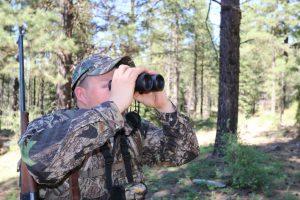 Hunters in North America have generations of experience in hunting game, whether its small game or larger animals like deer, elk or bear. People hunt with rifles, handguns, muzzleloaders, bow and arrows, and even cameras. Whitetailed deer roam throughout the U.S. Some people hunt for sport while most hunt for food. Deer are located in the U.S., Canada, and Mexico, but they differ in size in different areas.
Hunters in North America have generations of experience in hunting game, whether its small game or larger animals like deer, elk or bear. People hunt with rifles, handguns, muzzleloaders, bow and arrows, and even cameras. Whitetailed deer roam throughout the U.S. Some people hunt for sport while most hunt for food. Deer are located in the U.S., Canada, and Mexico, but they differ in size in different areas.
Getting Prepared
Good hunters know the rules of the land long before hunting season begins. You should study safety manuals and local and state laws before setting foot in the woods. Novice hunters often get advice from their elders as well as training instructors. There is no such thing as having too much knowledge.
Know the Rules
Every state has specific laws about hunting. Game wardens protect certain areas of the land and also enforce the rules that should be observed by hunters. You should choose a location that suits your purpose while making sure it’s legal, whether it is on public or private land. Hunters planning to set up on private land must have the owner’s permission. The state must issue a license no matter what you hunt or with what type of weapon. Game Wardens also regulate the type of ammunition that can be used. Old-timers who know the rules should brush up in case of any changes in the law.
Tools
Hunters love guns and accessories, but there are more things that should be on the list to make your hunting trip a success. The list of a hunter’s tools includes the gun using (.30-30, .243 Winchester, .30-06 Springfield, handgun or bow), camouflage clothing, weather-proof outer wear, compass, ammunition, food, water, cell phone, and a hunting knife, for starters. Unprepared hunters can often end up injured, missing, or worse.
Location is Everything
Animals have magnificent senses. They count on those senses to survive. Every seasoned hunter has an opinion on how to hunt deer, whether it involves stalking them in the woods or by sitting in a tree stand. Smart hunters know the lay of the land before they go out into the woods, usually in the dark. You should know how to spot and track the signs of different animals. You should learn to listen for rustling in the woods as well as knowing what sounds the animals makes. Don’t get so caught up in tracking your prey that you get lost. It is easy to get lost in the woods, especially in the winter.
Get a Hunting Buddy
Hunters often hunt alone, but it’s not a wise move. You could get injured and not make it home safely. You could break an ankle or be cornered by an animal. If you must travel alone, carry a flare gun and a cell phone to call for help. The buddy system guarantees that you can get help if needed. A buddy also makes the hunting trip more fun.
Enjoy the Experience
Experts call hunting the ultimate sport. No matter what you hunt, ensure that you practice safe habits and are using the right tools. You should never leave an injured animal to die. Most of all, enjoy the experience.